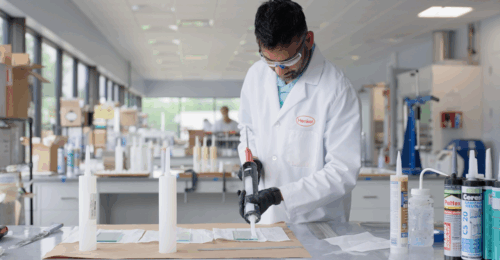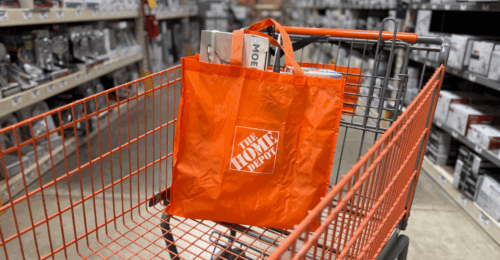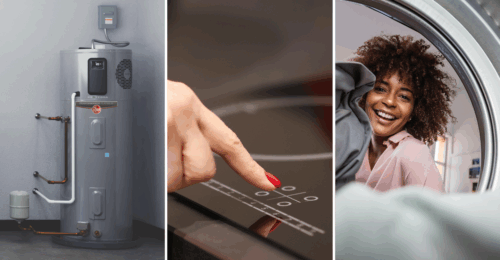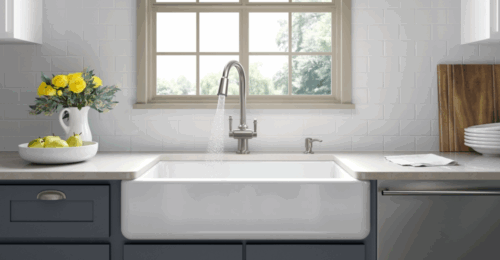 If there’s one department at The Home Depot that everyone knows, it’s the Cleaning aisle because almost every project under the sun begins and ends with cleaning.
If there’s one department at The Home Depot that everyone knows, it’s the Cleaning aisle because almost every project under the sun begins and ends with cleaning.
At The Home Depot, shoppers can find cleaning tools such as trash bags, brooms, buckets and mops in a department we call Indoor Garden. It may not be the first place you’d expect to find innovative, ecofriendly products, but there’s more to Indoor Garden than meets the eye. That’s why we’ve invited Ryan Moy to Eco Actions. Ryan is the merchant for Indoor Garden, and he’s taking us behind the aisles to learn about the innovation pipeline and exciting new products designed to help DIYers save time and effort and reduce plastic.
EA: Welcome to Eco Actions, Ryan. For people who don’t know what a merchant at The Home Depot does, tell us a little about yourself and your role.
RM: My name is Ryan Moy. I am a merchant at The Home Depot. I currently manage the cleaning business, and that’s within our D28 Indoor Garden department. Some of the categories I own are trash bags, mops and brooms. That’s your traditional cleaning tools and buckets for both indoor and outdoor.
EA: How much of your role involves interacting with shoppers?
RM: Quite a bit. We’re not just folks who stand in the office and behind computers and make decisions, crunching numbers all day. We’re in the stores every week. So, every Thursday, I’m in the stores. Oftentimes, I’ll rotate around to different stores around Atlanta. If I get lucky enough, I’ll get to see some markets a little bit further away. But the goal is to view how customers shop. Let’s stand in front of the bay, put ourselves in the customers’ shoes, and understand how they shop and what they look for. Are they looking for innovation? Are they looking for value?
Really, the only way to understand that and truly incorporate that into our products is to listen. And so, a big focus of ours is to listen to the customers. What project are you trying to do? How can it be better? Really leveraging that time in the stores, belly to belly with customers and our associates alike.
And that really plays an important role in how we make the products better, the bays better and just the general shopping experience better.
EA: Can you share any anecdotes that reveal what people are looking for when they shop your department?
RM: For us in cleaning (and every project starts and ends with cleaning, right?), people are first and foremost looking for a good product and a product that is innovative. They want a product that saves time, saves effort and saves money. That’s really innovation and value, which are important to us.
We’re always trying to find ways to make sure we are in front of the customers and top of mind. We want it to be an impulsive decision. “Hey, I didn’t know I’d need trash bags today. But, of course, here they are, and I’ll need them for the next month.” Or, “Hey, I’ve been looking to clean my house and clean my room. Here’s a mop at The Home Depot that’s an innovative solution. It separates the dirty water from the clean water, so I no longer have to keep dipping it in the dirty water bucket and putting it on the floor.”
That type of innovation is what we’re looking for to help solve problems and ultimately save time and money for customers.
EA: How often do shoppers report that ecofriendly products are high on their list?
RM: Sustainability and ecofriendly products matter quite a bit. Whether it’s from us being in stores, talking to customers ourselves or consumer insight studies done by our suppliers, it is clear that our customers care. And if our customers are given a choice between a sustainable, ecofriendly option and one that isn’t, nine times out of 10 they will take the one that is environmentally friendly. And I think it’s our job to source that right.
We’ll partner with folks like GLAD and say, “How can we do this? How can we make it easy? How do we make the shopping experience easy so that ecofriendly is something they don’t have to decide on?” For example, “I thought about being environmentally friendly in the past but didn’t quite know how. Now The Home Depot is offering a 10% recycled bag for the same price as a normal bag. So, I can contribute to making a better world for future generations.” When we can offer those types of products at no additional cost and no additional thought for the consumer, that’s a great answer.
EA: How much of your role involves interacting with suppliers? Can you tell us a little bit about those relationships, and how they impact what shoppers see?
RM: I would say it’s an everyday thing. For us, being The Home Depot, we are a big brand house. And in partnership with our suppliers, it’s our job to bring the most innovative items to shelf and make sure the shelves are stocked right. And we can’t do that without great suppliers.
Every day, I’m on the phone with half a dozen suppliers. We’re talking about the innovation pipeline – what’s coming in the next 6, 12, 18 months – or we are discussing new products. I might want to know their go-to-market strategy as it relates to marketing, such as what will go on social media to drum up some excitement about this. Or I may want to discuss plans to execute a refresh, making sure we’re buying the right amount and negotiating the right cost so that we are offering the right value to the customer. Because at the end of the day, my job as a merchant is to be an advocate for the customer. And I can only do that with good partners and good suppliers. It’s vital to our success to have good relationships with our suppliers.
EA: How does sustainability influence merchandising decisions, and what kind of evolution and innovation are you seeing when it comes to new products?
RM: Sustainability is always top of mind. Similar to what we talked about before, being able to provide that type of solution and make decisions easier for the customer are really what we’re aiming for. When we can, we partner with suppliers to offer solutions that allow consumers to feel really good about their decisions without paying extra. We really try to find ways to partner with folks on new and innovative products.
For example, we’ve seen more and more interest from consumers, as well as states and regulatory entities driving that innovation. We’ve got the state of Washington mandating that all trash bags include 10 percent recycled content by January 1st, 2023. Next year, we’ve got New Jersey mandating 10 to 20 percent recycled materials in products like trash bags.
So, our partnership with GLAD is fantastic. They’ve said that they want to be a leader in this space, and they want to move and make a difference in a bigger way. So, they’re not just offering 10 percent PCR in Washington or New Jersey. GLAD initiated a partnership with The Home Depot to bring a recycled content product nationwide. That means any customer, regardless of what state they’re living in, can buy it and feel good about how they’re contributing to reducing carbon emissions and being a better steward of the environment.
EA: Are there any other products or suppliers you’d like to highlight?
RM: Absolutely. So, O-Cedar is a very recognizable brand in cleaning tools, specifically for spin mops. Anyone who hasn’t been living under a rock has probably heard of the spin mop. It’s gone viral on TikTok. Now people are in love with cleaning. And O-Cedar is also highlighted on Eco Actions for their role in the plastic reduction project. They reduced plastic by over 80,000 pounds last year. They’re a phenomenal partner, and they’ve partnered with us to bring in a few different, exclusive items that, again, are innovative and save time and money for our consumers. We’re excited to have a few really good, exclusive offerings for our customers that they can only buy at The Home Depot.






